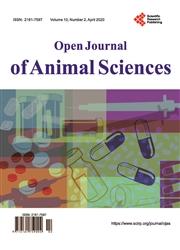Evaluation of the Hypothalamic Kisspeptin System throughout the Estrous Cycle in Gilts
引用次数: 0
Abstract
Kisspeptin has been demonstrated to affect reproductive cyclicity and the attainment of puberty in multiple species, presumably through its actions on gonadotropin releasing hormone and luteinizing hormone. Kisspeptin administration causes increased plasma concentrations of LH in pigs, sheep, and rats. The objective of this experiment was to evaluate changes in the hypothalamic kisspeptin system throughout the estrous cycle in gilts. Estrus was synchronized in forty crossbred gilts (191 d, 121 kg) and estrus detection was performed by exposing gilts to a mature boar. The first day gilts stood immobile was denoted d 1 of the estrous cycle. Blood samples were collected via jugular venipuncture on d 1, 4, 7, 9, 14, 16, and 19 of the estrous cycle. Ten animals were slaughtered on d 1, 9, 14, and 21 of the estrous cycle when medial basal hypothalami, anterior pituitary glands, and blood were collected. Relative expression of hypothalamic kisspeptin (KISS1), kisspeptin receptor (KISS1R), estrogen receptors-a, anterior pituitary gland GnRH receptor, β-actin, and GAPDH was determined using real-time reverse transcriptase PCR. Fold changes in relative expression were determined using the Relative Expression Software Tool. Relative expression of KISS1 was increased (P = 0.006) 3.2 fold on d 1 versus d 21 and 2.3 fold (P = 0.003) on d 9 versus d 21 of the estrous cycle, but was not different (P > 0.05) among the remaining days of the estrous cycle. Relative expression of estrogen receptor-b was decreased (P = 0.05) 0.8 fold on d 9 versus d 21 and (P = 0.005) 0.7 fold on d 14 versus d 21, but was not different (P > 0.05) among the remaining days. Relative expression of anterior pituitary gland GnRH receptor was increased (P在Gilts的整个发情周期中评估下丘脑Kisspeptin系统
Kisspeptin已被证明会影响多个物种的生殖周期和青春期的实现,可能是通过其对促性腺激素释放激素和黄体生成激素的作用。Kisspeptin给药导致猪、绵羊和大鼠血浆LH浓度升高。本实验的目的是评估在母猪发情周期中下丘脑kisspeptin系统的变化。在40头杂交母猪(191天,121公斤)中同步发情,并通过将母猪暴露于成熟公猪来进行发情检测。母猪静止不动的第一天表示为发情周期的第1天。在发情周期的第1、4、7、9、14、16和19天通过颈静脉穿刺采集血样。在发情周期的第1天、第9天、第14天和第21天屠宰10只动物,采集内侧基底下丘脑、垂体前叶和血液。使用实时逆转录聚合酶链式反应测定下丘脑kisspeptin(KISS1)、kisspepton受体(KISS1R)、雌激素受体-a、垂体前叶GnRH受体、β-肌动蛋白和GAPDH的相对表达。使用相对表达软件工具测定相对表达的折叠变化。KISS1的相对表达在发情周期的第1天比第21天增加了3.2倍(P=0.006),在第9天和第21天分别增加了2.3倍(P=0.003),但在发情周期剩余的几天之间没有差异(P>0.05)。雌激素受体-b的相对表达在第9天和第21天分别降低了0.8倍和0.7倍,但在其余天数之间没有差异(P>0.05)。垂体前叶GnRH受体的相对表达增加(P
本文章由计算机程序翻译,如有差异,请以英文原文为准。
求助全文
约1分钟内获得全文
求助全文

 求助内容:
求助内容: 应助结果提醒方式:
应助结果提醒方式:


